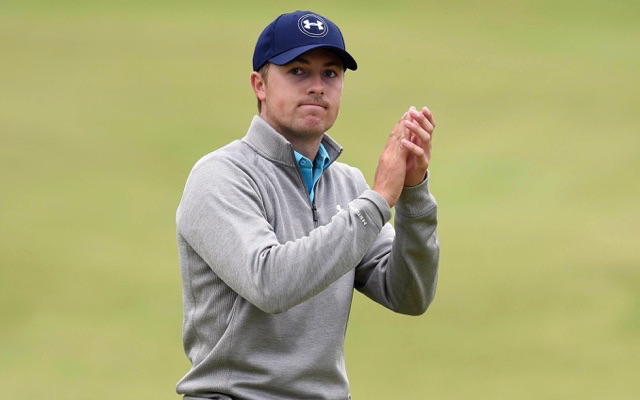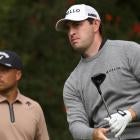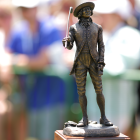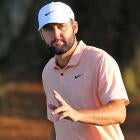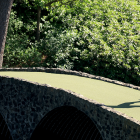I screamed.
I am a grown man with a mortgage and two kids (who were asleep at the time), and I screamed like a tween touching a swath of Niall Horan's jacket at a red carpet affair after Jordan Spieth sank his long birdie putt on the 70th hole at St. Andrews on Monday.
My wife jumped. I collapsed into my chair.
The Grand Slam was alive.
The ride Spieth took us on Monday (and this year) was something special. With three to play, he was down two to Marc Leishman. But Leishman bogeyed No. 16 and the door was open. Spieth hit a decent second shot and calmly poured his putt toward the cup. It never left the center. It was as if caddie Michael Greller had a joystick in his pocket and guided it home.
The tournament was tied.
In 1960, Arnold Palmer made a journey familiar to Spieth. He won the first two majors of the season and traveled to St. Andrews trying to keep the Grand Slam alive for the PGA Championship later that year.
"It took me a while to begin to understand what this golf course and what European golf and what the links golf was really all about," said Palmer of that year. "So it was quite a thrill."
He lost by one.
Nicklaus also lost the third leg of the Slam by one in 1972. Spieth followed them in 2015.
“It won’t hurt too bad,” Spieth said after his loss this year. “I made a lot of the right decisions down the stretch and certainly closed plenty of tournaments out, and this just wasn’t one of those. It’s hard to do that every single time. I won’t beat myself up too bad because I do understand that.”
What needs to be understood is that Spieth is lifting the ceiling on engagement in American golf in the post-Tiger era. If the Masters piqued interest and the US Open solidified it, this was something different altogether.
Spieth is more accomplished than Tiger Woods at this point in his career ... at least in the major championships.
Tiger's first 10 majors as a pro: 3 top 5s | 1 win Spieth's first 10 majors as a pro: 4 top 5s | 2 wins
— Kyle Porter (@KylePorterCBS) July 21, 2015
And it felt on Monday, just as it has so many times with Woods, that we were watching something historic, something we'd never seen before. People cared.
It felt for so many moments after that putt on No. 16 fell like we were about to see three straight -- Augusta, Chambers Bay and St. Andrews.
Can you fathom it?
But Spieth fell one stroke short and we miserably watched a playoff between two major champions and an Australian. It was a little like getting on the biggest roller coaster in the world only to find out the last quarter mile is straight uphill.
"There was some fantastic golf in major championship Monday, final round, that doesn't always happen," said Spieth. "There was some clutch playing by guys today, so I knew I needed to get another one on the back nine, which is not an easy place to try and steal one."
He tried, though. And don't let anyone tell you he choked. It was the furthest thing from that.
Field played last 4 holes in average of +1.11 in final round Spieth played them in even par Choke = LOL. Give Zach the credit he's due.
— Justin Ray (@JustinRayGC) July 21, 2015
Spieth even thought it was better than his win at Chambers Bay.
"I think the way that I played this week and especially today would have won the US Open by more than just a shot," he said. "I didn't play as well there. It's just that's the kind of golf that was played by the field this week, it just took some special golf. Whoever comes out the champion, that's a hell of a major."
And that's golf sometimes. You play your best and lose. You do not play your best and win. This leads us back to that 1960 Open at St. Andrews. The one Palmer lost by a shot.
Palmer talked with immense emotion last week at St. Andrews about that year. He lost to an Australian by the name of Kel Nagle.
"The trip in 1960 to come here and play and listen to the things that my father told me ..." he choked off the sentence with tears before continuing. "It's happening all week. I walk in a store or I see people here that I haven't seen in 30, 40 or 50 years and they all remember.
"That makes it great."
The point is not that Spieth lost at St. Andrews. The point is not that the Grand Slam died a late death in 2015. The point is that Spieth made us in the United States care immensely about a tiny town in Scotland on an otherwise quiet Monday.
He made us live and die with every shot. He made us text our friends and call our parents.
Are you seeing this? Is this really going to happen?
He made us want to go play golf the day after a major. He made us fall in love with St. Andrews again. He made us forget about Rory McIlroy's injured foot. He made forget about Tiger Woods' injured game. He made us root against an amateur winning a major! He even made us search for spotty WiFi in a plane over Iceland.
He made us toast a loser.
In 50 years, Spieth will return to the Old Course to watch a bunch of kids who haven't even been born yet, and he will well up remembering the great Open of 2015. It seems so far away right now and yet Palmer's presence, heck, Tiger's presence, remind us that time spins solemnly and quickly.
He won't care that he lost to Zach Johnson and neither will we. We'll talk about the putt on 16 and how hard the Road Hole still is to this day. We'll remember the 2015 Open as one of the best ever.
Because Jordan Spieth made it great.
